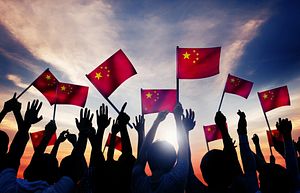Since the ruling in the Philippines’ South China Sea arbitration case was released on July 12, WeChat and the microblogs used daily by the majority of Chinese people have been flooded with two pictures. One is a letter which calls on veterans to enroll in the army again, with the similar comment, “ if there is a war, I will be back to the front upon the call.” The other picture is a map of Chinese territory which marks out the nine-dash line, with the caption that “This is Chinese territory, not an inch of it can be lost.” It may not be surprising that the arbitration tribunal announced such an unfavorable outcome, but it is a little unexpected that Chinese patriotism has accumulated to the extent of this unprecedented unity and consolidation.
This obvious response from the Chinese mass population has some implications. When it comes to the South China Sea issue, pundits and scholars usually focus on elite politics or the diplomatic behavior of the Chinese side. The area of civilian appeals or public emotions is seldom discussed or studied, much less the core themes or effects of China’s new nationalism. Traditionally, we would expected that when living conditions have improved, the grassroots class is unlikely to become radical, because their basic needs have been satisfied. However, contrary to the prediction, the Chinese nationalism is resurging rather than declining, even though its GDP per capita has soared into a new historical height. If the external material atmosphere has changed, what other factors can we see as the cause?
A look back at history can afford an effective approach to solving these questions. It is conventional wisdom that Chinese nationalism originated from the May Fourth Movement. On May 4, 1919, Chinese students revolted due to the injustice of the Paris Peace Conference and the incompetence and impotence of the then-Chinese government. But for those who are familiar with Chinese history, Chinese nationalism can be traced back much further, to the First Opium War in 1840, which started a century-long invasion by Westerners. Before the May Fourth Movement in 1919, China responded to this historical humiliation in a top-down way with the following four events: the Westernization drive, the Reform Movement of 1898, the new policies of latter stage of the Qing Dynasty, and finally the Revolution of 1911. However, in 1919 the May Fourth Movement became a new watershed, marking the time when mass nationalism started to affect the state’s behavior in a bottom-up way.
No matter which approach China has chosen, the damage and loss of national sovereignty and territory is seen as having brought about the whole nation’s humiliation and thereafter aroused extensive patriotism. That is to say, sovereignty and territorial integrity are deemed as national dignity, which unites the whole society. Even after China realized its independence, the core theme of Chinese nationalism still remains: that is the quest to achieve national rejuvenation and be rid of the century-long humiliation. This can explain why Chinese people always overreact to issues touching on national dignity, and why they are so sensitive to South China Sea arbitration case.
Another lesson from this historical experience is that Chinese nationalism is accustomed to reacting to extrinsic stimulants — in other words, it is passive and responsive. This idea could find its roots in the way Chinese Confucian culture maintained and reinforced regime legitimacy and social stability in the Western Han Dynasty (206 BCE- 24 CE). Since then, “rule by man” (人治) and “benevolent rule” (善治) — instead of “the rule of law” (法治) — have become the holy principles for tackling internal or external issues. In some sense, this shapes the way Chinese conceive of Westerners and foreigners, especially China’s neighbors. “If they don’t offend me, I will not offend them” (人不犯我我不犯人) may be the best traditional proverb to describe this national sentiment toward rivals and adversaries. This responsive national characteristic is fully embedded in China’s military strategy of “active defense,” its retaliative nuclear strategy, and the maritime strategy of “near sea defense, far sea protection.”
Historical and cultural backgrounds can provide meaningful tools to probe into seemingly complex Chinese nationalism. The unique relationship between the Communist Party of China (CPC) and its populace could serve as a third key to understanding Chinese nationalism. In an absolute leadership position, the CPC in general represents the state. Some scholars argue that the CPC has dominated the direction of Chinese nationalism since the 1990s. To them, as one of the tools to reinforce the legitimacy of the CPC, Chinese nationalism is thus distinct from Western nationalism.
Since entering into the new millennium, however, the party-nation relationship has modified. Nationalism has evolved into a new popular nationalism which exhibit the following characteristics: the population values national esteem more than any time before; no longer endures condemnations from the international society; has no patience with certain behaviors or decisions by the authorities; and worship a totally new international order. This irrational, intemperate national sentiment, deviating from intrinsic nature of Chinese nationalism seen through history, derived from the vulnerable groups or “have-nots” who did not enjoy the benefits of the Reform and Opening policy. The “have-not” psychology responds radically to any injustice and critique they face.
Many Westerners use words like confident, arrogant, or assertive to describe the nature of Chinese nationalism. It is true that in some occasions, especially those concerning sovereignty or territorial issues, Chinese popular nationalism tends to act more proactively. However, considering the historical and cultural context, Chinese nationalism is generally responsive and introverted, with the theme of national rejuvenation from its century of humiliation. China’s economic ascent without corresponding social and welfare equality, however, has resulted in the irrational and truculent sentiments of a segment of the Chinese population, which should be distinguished from real Chinese nationalism.
Luo Xi received a Ph.D in International Politics from Renmin University of China.
































